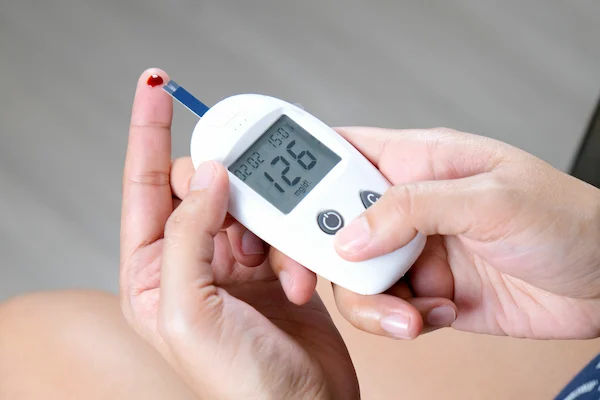What Foods to Avoid with Diabetes: A Guide for Better Blood Sugar Control
Discover the foods to avoid with diabetes to manage blood sugar effectively. Find healthier alternatives for better diabetes control and improved overall health.

Written by Dr Sonia Bhatt
Last updated on 3rd Jul, 2025
Living with diabetes requires making informed decisions about what you eat, as food directly impacts your blood sugar levels. While no single food alone will cause or cure diabetes, understanding what foods to avoid with diabetes is essential for managing the condition effectively. This article will guide you through the foods that should be avoided, explain why they are problematic, and offer suggestions for healthier alternatives.
Whether you're newly diagnosed or have been living with diabetes for years, learning what foods to avoid with diabetes is key to maintaining a balanced diet and ensuring better blood sugar control. Let’s dive in.
Understanding Diabetes and Blood Sugar Control
Diabetes is a chronic condition that affects the body’s ability to regulate blood sugar (glucose). There are two main types of diabetes:
Type 1 diabetes: An autoimmune condition where the body doesn’t produce insulin, a hormone that helps glucose enter the body’s cells.
Type 2 diabetes: A condition where the body either becomes resistant to insulin or doesn’t produce enough of it. It’s the most common form of diabetes.
Managing blood sugar levels is vital for people with diabetes. Eating the right foods and avoiding certain foods can help keep glucose levels in check and prevent complications such as heart disease, nerve damage, or kidney problems.
What Foods to Avoid with Diabetes: Key Offenders
Knowing what foods to avoid with diabetes can make a significant difference in controlling blood sugar levels. Below are the foods that should be limited or eliminated from your diet:
1. Refined Carbohydrates and Sugary Foods
When it comes to what foods to avoid with diabetes, refined carbohydrates and foods high in sugar are at the top of the list. These foods can cause a sharp spike in blood sugar levels, making it harder to control glucose levels.
Examples of foods to avoid:
White bread and other products made with refined flour.
Candy and sweet desserts like cakes, cookies, and pastries.
Breakfast cereals with added sugar.
Foods like white bread and candy are high on the glycaemic index (GI), quickly raising blood glucose levels. For those with diabetes, managing blood sugar levels is key, and consuming high-GI foods can undermine your efforts. Instead, choose whole grains and complex carbohydrates, which help maintain steadier blood sugar levels.
2. Fried and Fast Foods
Another important group of foods to avoid with diabetes are fried and fast foods, which are high in unhealthy fats. These foods not only contribute to weight gain but can also worsen insulin resistance.
Examples of foods to avoid:
French fries, fried chicken, and deep-fried snacks
Fast food items, like burgers and fried fish
Packaged chips and crisps
Fried foods are loaded with saturated fats and trans fats, which can increase your risk for heart disease, a condition that is already more common in people with diabetes. Choose healthier cooking methods like baking, grilling, or steaming for a better heart-healthy diet.
3. Sugary Beverages
One of the most common dietary triggers for people with diabetes is sugar-laden beverages. These drinks cause blood sugar spikes that are difficult to manage.
Examples of sugary drinks to avoid:
Regular soda and sweetened soft drinks
Fruit juices with added sugars
Sweetened iced tea and energy drinks
Sugary drinks are rapidly absorbed into your bloodstream, causing blood sugar levels to spike. They also offer little nutritional value and can lead to weight gain, which worsens diabetes symptoms. Opt for unsweetened beverages such as water, herbal teas, or sparkling water with a splash of lemon.
4. Full-Fat Dairy Products
Many full-fat dairy products are high in saturated fats, which can worsen insulin resistance and raise cholesterol levels.
Examples of full-fat dairy to avoid:
Whole milk and full-fat yoghurt
Cheese, especially hard varieties like cheddar
Butter and cream
Full-fat dairy can contribute to increased cholesterol levels and an elevated risk of heart disease. People with diabetes are already at higher risk for cardiovascular issues, so it's best to avoid these foods. Choose low-fat or non-fat dairy alternatives to maintain heart health.
5. Processed Meats
When thinking about what foods to avoid with diabetes, don’t overlook processed meats high in unhealthy fats and sodium. These meats can also contribute to inflammation and increase the risk of heart disease.
Examples of processed meats to avoid:
Bacon and sausages
Hot dogs and deli meats
Canned meats
Processed meats are often high in sodium, which can lead to high blood pressure, a common complication of diabetes. The saturated fats found in processed meats also contribute to insulin resistance. Lean cuts of meat and plant-based proteins are better choices.
6. Alcohol in Excess
For people with diabetes, excessive alcohol consumption can lead to unpredictable blood sugar levels. Alcohol can lower blood sugar levels too much (hypoglycaemia) or cause them to rise too high.
Examples of alcoholic beverages to avoid:
Beer with high sugar content
Cocktails made with sugary mixers (like margaritas or piña coladas)
Sweet wines and dessert wines
Excessive alcohol interferes with blood sugar control and can also contribute to weight gain. If you do drink, do so in moderation and ensure you’re monitoring your blood sugar levels closely.
7. Canned and Pre-Packaged Foods
Canned and pre-packaged foods can often be high in sodium, sugar, and unhealthy fats, disrupting blood sugar control.
Examples of pre-packaged foods to avoid:
Canned soups with added sodium
Frozen dinners and microwave meals
Packaged snacks like cookies, chips, and candy bars
These foods often contain preservatives and excessive salt, both of which are harmful to people with diabetes. Instead, opt for fresh, whole foods and home-cooked meals to keep your diet healthy and blood sugar levels stable.
Healthy Alternatives for People with Diabetes
Instead of the foods listed above, here are some better choices for people looking to manage their diabetes:
Whole grains: Brown rice, quinoa, whole-wheat bread, and oatmeal.
Lean proteins: Skinless chicken, fish, beans, and plant-based proteins like tofu and lentils.
Non-starchy vegetables: Leafy greens, broccoli, cauliflower, and bell peppers.
Healthy fats: Avocados, nuts, olive oil, and seeds.
Fruits in moderation: Berries, apples, and pears (preferably whole fruits rather than juices).
Conclusion: How to Manage Diabetes with Food Choices
When you ask, “What foods to avoid with diabetes?”, it’s not just about restricting certain foods but understanding how different foods affect your blood sugar and overall health. You can maintain better blood sugar control and live healthier by avoiding foods that cause blood sugar spikes, weight gain, or heart disease risk.
Consult your doctor or a registered dietitian for personalised guidance on what foods to avoid with diabetes and how to tailor your diet for optimal management. With the right food choices, you can take control of your health and prevent complications associated with diabetes.
Consult Top Diabetologists
Consult Top Diabetologists

Dr. Liritha C
General Physician/ Internal Medicine Specialist
5 Years • MBBS, MD (GENERAL MEDICINE)
Hyderabad
Apollo 24|7 Clinic, Hyderabad

Dr. Suraja Nutulapati
General Physician/ Internal Medicine Specialist
10 Years • MBBS, MD (Internal Medicine)
Hyderabad
Apollo 24|7 Clinic, Hyderabad
(850+ Patients)

Dr. Lakshmi Sindhura Kakani
General Physician/ Internal Medicine Specialist
10 Years • MBBS, MD (General medicine)
Visakhapatnam
Apollo 24|7 Clinic - Andhra Pradesh, Visakhapatnam

Dr. Bhaskar Mukhopadhyay
Diabetologist
20 Years • MBBS DNB RCGP PGCC
Kolkata
MEDICURE, Kolkata

Dr. Usha Gaddams Clinic
General Physician/ Internal Medicine Specialist
9 Years • MBBS, DNB (Internal Medicine), For Physical consult(6302986818)
Hyderabad
DR. USHA GADDAMS CLINIC, Hyderabad



